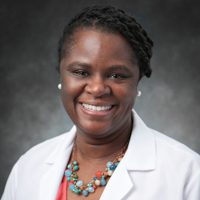‘We Are Our History’ | Evelyn A. Reynolds, MD

Evelyn A. Reynolds, MD
Too often, the history of Black people is viewed in a vacuum, limited to Black History Month in the United States. To understand why, we must contextualize the prism of Western colonialism through which we view history. “Black History” is a misnomer. The truth is that Black peoples (peoples should be plural as Black peoples come from multiple heritages, ethnicities, and nationalities) have created and contributed to the world’s history as a whole and throughout time. However, we compartmentalize the teaching of history of Black people in the U.S. and globally due to the American caste system and the indelible mark that colonialism has left on the world.
My personal story highlights both those aspects, colonialism and the American caste system. My parents immigrated to the U.S. in the 1960s from Guyana, South America, formerly British Guiana, where they were both trained as nurses. My parents were recruited to the U.S. because many hospital wards were becoming racially integrated and a “nursing shortage” emerged. As my parents and many knew, white licensed healthcare providers did not want to care for Black patients, however, systemic and institutional racism created barriers that prevented Black people from being educated and trained in the medical professions. I entered medical school at the same hospital to which my parents had been recruited to integrate thirty years prior. As I began my clinical rotations and I shared the name of my preceptor, my mother recalled that as a young attending, my preceptor had been opposed to integration of the health system. That was eye-opening to me about how close and connected my present was to the past.
It explains how decades later, these structural barriers remain. From 1978 to 2019, the percentage of Black men enrolled in medical school decreased from 3.1% to 2.9%. There was only a modest increase in the percentage of Black women enrolled in medical school over the same period, from 3.6% to 4.4%. Medical schools affiliated with Historically Black Colleges and Universities (HBCU) disproportionately account for 15% of Black medical students. Thus, despite the medical profession’s claim that it would like to increase racial and ethnic diversity among health professionals, outside of the HBCU system, enrollment of Black males has remained at 2.4%.1 This trend is more poignant as we look at sub-specialties in medicine such as our own. Gynecologic Oncology fellowships report a lower proportion of Black physicians when compared to obstetrics and gynecology as well as other medical and surgical specialties.2
Studies have demonstrated the importance of representation in relation to outcomes for Black patients. Black newborns under the care of Black physicians have lower mortality than Black newborns with white physicians.3 Black physicians are less likely to harbor anti-Black biases, which frees them to provide better care, which translates into improved patient outcomes. While we, as a profession, need to improve cultural humility and address bias among all our colleagues caring for our diverse patients, increasing diversity among our profession would go a long way toward improving the health of our society and minimizing health disparities.
Cultural humility would require healthcare professionals to understand the reason Black Americans distrust the healthcare system as both historical and contemporary. It is why we can now acknowledge that the so-called father of gynecology was unethical and while his methods were contemporaneously debated, we still allowed him to be celebrated with statues and eponymous instruments. Racism unfortunately permeates every aspect of society, including the healthcare system.
One of the frustrations and tragedies of Black History Month is our celebration of a few Black American Icons (Rosa Parks, Martin Luther King Jr., John Lewis…) with the exclusion of many, and then pack it away until the next year. We need to remember the reason we need a Black History Month. Black History is simply history that we choose to otherize. The enslaved cannot be separated from enslavers. Colonialism cannot be separated from extractive capitalism replete with human rights violations, exploitation, and destabilization of countless societies. As James Baldwin reminded us, “history is not the past. It is the present. We carry our history with us. We are our history.” It seems that we, as a society, are finally living and embracing this sentiment. So, for me, Black History Month is a period for reflection. I hope you will join me in that reflection as we imagine how we can learn from our past to improve the medical profession and our specialty and ensure a better, healthier, and more promising future for all.
References
1. Morris DB, Grupposo PA, McGee HA, Murillo AL, Grover A, Adashi EY. Diversity of the National Medical Student Body – Four Decades of Inequities. NEJM. 2021; 384(17): 1661 – 1668.
2. Ngo NT, Aniagolu N, Lang J, Mcdougale A, Ekwenna O. Underrepresented minority representation trends in gynecologic oncology fellowships in the United States. Gynecologic Oncology. 2021; 160: 485 – 491.
3. Greenwood BN, Hardenman RR, Huang L, Sojourner A. Physician-patient racial concordance and disparities in birthing mortality for newborns. PNAS. 2020; 117(35):21194 – 21200.
Evelyn A. Reynolds, MD, is a gynecologic oncologist in Atlanta, GA.
This column is sponsored by an unrestricted grant from GSK. Sponsorship excludes editorial input. Content developed by the SGO Diversity, Inclusion & Health Equity Committee.